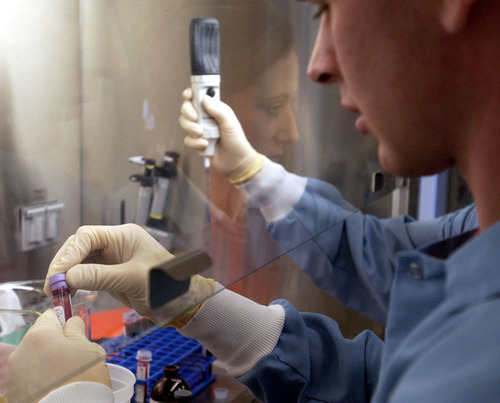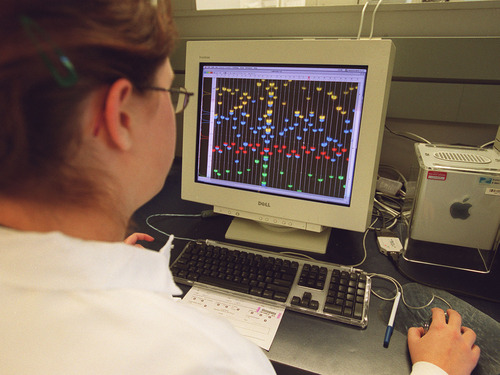This is an archived article that was published on sltrib.com in 2013, and information in the article may be outdated. It is provided only for personal research purposes and may not be reprinted.
In a landmark case, a unanimous U.S. Supreme Court has invalidated key parts of patents that Salt Lake City-based Myriad Genetics Inc. held on human genes related to hereditary breast and ovarian cancers.
The court's ruling Thursday seemingly puts an end to the emotionally charged case brought four years ago by the American Civil Liberties Union and Public Patent Foundation on behalf of medical researchers, doctors, patients, women's health advocates and others. They had argued that, as a product of nature, human genes should not be eligible for patents. They sought to invalidate patents related to genes called BRCA1 and BRCA2, the mutation of which indicates a high probability of contracting hereditary breast and ovarian cancers.
ACLU attorney Sandra Park hailed the decision as removing a "major barrier" to development of other genetic tests and for patient care and medical innovation.
"Myriad did not invent the BRCA genes and should not control them," Park said in a statement. "Because of this ruling, patients will have greater access to genetic testing and scientists can engage in research on these genes without fear of being sued."
Harry Ostrer, one of the lawsuit plaintiffs, said the decision would open competition for BRCA1 and BRCA2 tests. "As a result of this, the cost of genetic testing should come down significantly," he noted in a telephone conference call with reporters.
In fact, just after the decision was released, DNATraits, a division of Houston-based Gene By Gene Ltd., announced it would offer testing for the BRCA1 and BRCA2 genes in the United States for $995. That compares to $4,000 for the Myriad test.
But even though the decision reversed the practice of three decades of granting patents on genes isolated from the body, the ruling may not have a deep, long-lasting impact on the biotechnology industry or on Myriad Genetics.
Ken Chahine, a University of Utah law professor and former biotech company CEO, said he sees little impact on the industry, which had been expecting the ruling. Myriad also has a large and exclusive database cataloging gene mutations that should give it a big advantage against the new competition to provide BRAC1 and BRAC2 tests, he said.
"The [test] interpretation that Myriad can do is something no one else can do," he said.
The Biotechnology Industry Organization, which had supported Myriad's legal position, pointed out the ruling also upheld patents on cDNA, genes that are substantially altered in a laboratory. That portion of the decision "offers urgently needed certainty" for companies that create or use that form of genetic material, the group said.
"In other respects, however, the Supreme Court's decision today represents a troubling departure from decades of judicial and Patent and Trademark Office precedent supporting the patentability of DNA molecules that mimic naturally occurring sequences," Jim Greenwood, president and CEO of the industry group, said in a statement.
For their part, Myriad officials insisted that the ruling would have little effect on the company's bottom line or on its ability to offer the expensive tests.
Along with the cDNA patents, the decision authored by Justice Clarence Thomas also mentioned that Myriad or other companies could patent methods for studying or working with genes. That means, Myriad officials said, that the company retains sufficient patent protections.
"We're still comfortable we have ample intellectual property protection for our products," said Richard Marsh, Myriad executive vice president and general counsel.
Myriad's shares on the Nasdaq stock exchange were up most of the day after the decision was released, by more than 10 percent at one point. But they but fell into negative territory in the final hour of trading, plunging as much as 10 percent before recovering to finish the day down 5.6 percent, or $32.01 a share.
The company had been criticized by patients and advocates who said its tests were costly and that there was no option for a second opinion after a positive test because Myriad's patents allowed it to stifle potential competition.
Myriad also has been slammed for the $4,000 cost of the tests. But on Thursday, Myriad officials said that with the Affordable Care Act, known as Obamacare, almost all women have either no out-of-pocket expenses or need to pay only around $100 for the test. In addition, the company offers free or lower-cost testing for some patients based on income.
Myriad also denies it has stifled research, pointing to 10,000 papers its officials say have been written about the genes since the patents were issued.
The company, which employs about 1,200 people, processes 250,000 BRAC1 and BRAC2 tests a year. Officials pointed out that the court left untouched about 500 claims within Myriad's 24 patents related to the tests.
Those patents start to expire in about two years, but the company said it believes it has solid patent protection through 2018.
The University of Utah has licensed some gene patents based on its research to Myriad and was a party to the lawsuit. But U. officials said Thursday they're not expecting the decision to have a substantial effect on the school or its royalty revenue.
"We don't think it's going to have much of an impact at the university," said spokesman Keith Sterling, who declined to comment on the nature of the licensing agreement with Myriad.
Twitter: TomHarveySltrib
Reporter Lindsay Whitehurst contributed to this story.





